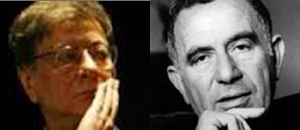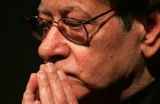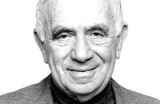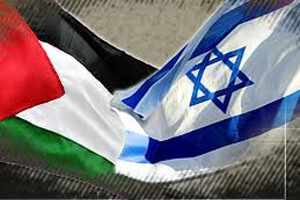Mahmoud Darwish and Yehuda Amichai in a Web of Opposition and Contradiction
“Normal is an illusion. What is normal for the spider is chaos for the fly”- Morticia Addams.
The conversation that began in The Artifice article Fear and Loathing in Israel/Palestine continues with two critical poets; Mahmoud Darwish, Palestinian and Yehuda Amichai, Israeli. Each poet searches their soul to look at the opposition and contradiction in Israel/Palestine as well as Jew/Arab and Muslim/Jew. Mahmoud Darwish’s earlier works were pluralist towards Israel/Palestine; however, a few years later, contradiction became clear. Yehuda Amichai speaks from his point of view, as a Zionist. Then again, there are poems that are contrary to Amichai’s self-interest and have inclusion of the Arab. There are moments, which echo mutual respect and then there are moments that interweave opposition, contradiction and the illusion of normal.
Contradictions and Oppositions
Contradictions and oppositions between Arabs and Jews define the others’ existence. The simplest comparison between Arab and Jew, they have the same Semitic genes, belief in a monotheistic creator and do not worship idols. Each has their own house of worship, scripture and language. Opposition begins with Persian influence over Arabs and European and East Asian influence over Jews (Difference Between Arabs and Jews 2012, and Wade 2000). Contradiction is found in their religious scriptures, which lead to a causal effect of contradictions and oppositional interpretations. Civil unrest remains in Israel/Palestine as well as between Jew/Arab and Muslim/Jew. As the web of Zion’s nationalism creates havoc for the Arabs caught in its filament each has their own version of what is normal. Mahmoud Darwish explores the sameness of Arab/Jew and Israeli/Palestinian through his inclusive poem He is quiet and so am I.

He is quiet and so am I…
He is quiet and so am I.
He sips tea with lemon, while I drink coffee.
That’s the difference between us.
Like me, he wears a wide, striped shirt,
And like him, I read the evening paper.
He doesn’t see my secret glance.
I don’t see his secret glance.
He’s quiet and so am I.
He asks the waiter something.
A black cat walks between us.
I feel the midnight of its fur
And he feels the midnight of its fur…
I don’t say to him: The sky today
Is clear and blue.
He doesn’t say to me: the sky today is clear.
He’s watched and the one watching.
I move my left foot.
He moves his right foot.
I hum the melody of a song
And he hums the melody of a similar song.
I wonder: Is he the mirror in which I see myself?
And turn to look in his eyes…but I don’t see him.
I hurry from the café.
I think: Maybe he’s a killer…
Or maybe a passerby who thinks
I am a killer.
He’s afraid …and so am I.

Mahmoud Darwish wrote poems, which linger with lyrical elegance. He professed pluralism; pleading for reconciliation of the past yet, aware of the realities of Israel/Palestine. Darwish put forth the message to strive for the long-lost unity in his 1966 poem A Lover from Palestine. As the Zionist began their journey into Palestine Darwish was empathic to the Israeli and reverently welcomed them; “So that our next generation may recall the path of return to our home”(Lines 94-95). Darwish continues his plea for unity in the following poem.
A Lover from Palestine
Yesterday I saw you in the port,
A long voyager without provisions.
Like an orphan I ran to you,
Asking the wisdom of our forefathers:
How can the ever-verdant orange grove be dragged
To prison, to exile, to a port,
And despite all her travels,
Despite the scent of salt and longing,
Remain evergreen?
I write in my diary:
I love the oranges and hate the port
And I write further:
on the dock
I stood, and saw the world through Witter’s eyes
Only the orange peel is ours, and behind me lay the desert. /(25-39)
However, Darwish’s empathetic welcome led to devastating opposition. How long can one remain welcoming while watching their land, home and loved ones uprooted? An opposition begins to cultivate within Darwish’s later poems, although still lingering and lyrical yet, somewhat contradicting from A Lover of Palestine. Darwish explores a different flavor; more embittered and acerbic in his 1969 poem Diary of a Palestine Wound.
Diary of a Palestine Wound
We do not need to be reminded:
Mount Carmel is in us / (1-2).
We and our country are one flesh and bone.
Before June we were not fledgling doves
so our love did not wither in bondage / (6-8).
The shadow that descends over your eyes
demon of a God
who came out of the month of June
to wrap around our heads the sun-
his color is martyrdom
the taste of prayer.
How well he kills, how well he resurrects!
The night that began in your eyes –
in my soul it was a long night’s end / (12-20):
And we came to know what makes the voice of the nightingale
a dagger shining in the face of the invaders. / (24-25)
This land absorbs the skins of martyrs / (34).
We are its wound, but a wound that fights / (38).
In the rubble of legends he searches for his own eyes
to show
that I am a sightless vagrant on the road
with not one letter in civilization’s alphabet / (50-52).
Time to prove my love for the land and for the nightingale:
For in this age the weapon devours the guitar
And in the mirror I have been fading more and more
Since at my back a tree began to grow /(56-59).
“Do I contradict myself? Very well then I contradict myself (I am large; I contain multitudes.)” Walt Whitman poses this question of contradiction in his work Songs of Myself (The Critic 1860).

Contradiction and opposition are now blatant in Darwish’s poem I have the wisdom of one condemned. His work began to reflect the method similar to the Israeli poet Yehuda Amichai. It is clear in his poetic structure that some internal change took place. His poetry is much shorter and less lyrical, less pluralist and more self-centered. It is if Darwish had transformed his illusion of normalcy; the empathy turned to apathy; the wound left gaping and death all-consuming as conveyed in the following poem.
I have the wisdom of one condemned…
I have the wisdom of one condemned to die,
I possess nothing so nothing can possess me
and have written my will in my own blood:
‘O inhabitants of my song: trust in water’
and I sleep pierced and crowned by my tomorrow…
I dreamed the earth’s heart is greater
than its map,
more clear than its mirrors
and my gallows.
I was lost in a white cloud that carried me up high
as if I were a hoopoe
and the wind itself my wings.
At dawn, the call of the night guard
woke me from my dream, from my language:
You will live another death,
so revise your last will,
the hour of execution is postponed again.
I asked: Until when?
He said: Wait till you have died some more.
I said: I possess nothing so nothing can possess me
and have written my will in my own blood:
‘O inhabitants of my song: trust in water.
“Life is for the living. Death is for the dead. Let Life be like music. And death a note unsaid” -Langston Hughes. Hughes struggles with the oppositions of life and death, which are a daily activity in Israel/Palestine between Israeli/Arab and Jew/Muslim. The Israeli poet Yehuda Amichai writes with brevity and in a monism manner with self-interest, which is clear in the titles; I Don’t Know if History Repeats Itself, I know A Man, I Have Become Very Hairy, and I Want To Die In My Own Bed. Amichai’s has other poems, which center on the speaker’s voice; A Pity. We Were Such a Good Invention, Ein Yahav, God Full of Mercy, and Great Serenity: Questions and Answers. However, there are a few poems that focus on Israeli/Arab and even a poem that speaks of a relationship with an Arab.
An Arab Shepherd is Searching for His Goat on Mount Zion
An Arab shepherd is searching for his goat on Mount Zion
And on the opposite hill I am searching for my little boy.
An Arab shepherd and a Jewish father
Both in their temporary failure.
Our two voices met above
The Sultan’s Pool in the valley between us.
Neither of us wants the boy or the goat
To get caught in the wheels
Of the “Had Gadya” machine.Afterward we found them among the bushes,
And our voices came back inside us
Laughing and crying.Searching for a goat or for a child has always been
The beginning of a new religion in these mountains.

In the poem An Arab Shepherd is Searching for His Goat on Mount Zion, there is despair; the heart of the Jew and the heart of the Arab beat together. One pulse between them; pounding loudly in a fearful moment. Conversely, once the fear shattered the light shines through; the hearts separate no longer in unison do they beat. They revert back to what they know and each beat, beats with an indifference. In addition, Professor Alick Isaacs’ analysis of Amichai’s poem describes opposition and conflict between the Arab and Jew through their shared cultural symbolism. For example, the missing Jewish child and the Arab’s lost goat are like the sacrifice of Isaac and/or Ishmael according to Isaacs. Amichai continues the shared culture of Arab/Jew, Israel/Palestine, and Muslim/Jew both past and present with grace in the Endless Poem.
Endless Poem
In a modern museum
In an old synagogue
In the synagogue
I
Within me
My heart
A museum
Within a museum
A synagogue
Within it
I
Within me
My heart
Within me
My heart
Within my heart
A museum
Yehuda Amichai’s Endless Poem, is a perpetual mirror that faces parallel to the echoes of the infinite. These eminent reflections are endless symbolism of the grace of humanity. The Endless Poem, is simple and rhythmic of humanity, religiosity and evolution in all its architectonic. Amichai explores the present state of Israel/Palestine as a modern museum; it then proceeds to an antiquated synagogue with Judaism at the heart of it all. He takes the modern humanity infused it with the antiquated religion to find himself. Amichia mirrored self-reflection between old religion and beliefs to present human conditions in Israel/Palestine. The division between the old and the new creates division, oppositions and contradictions. A synagogue made by humans to house the spirit within its prescribed parameters; the museum made by humans to house the spirit of humanity through art and collaborative creation that knows no boundaries. The past must look into the future; the future must reflect the past and contradictions, and oppositions collide and energy transfers back and forth and keeps the beat of the human heart between Israeli/Palestine, Arab/Jew and Muslim/Jew.

Juxtaposition of Poetic Discord
“Beyond the edge of the world, there’s a space where emptiness and substance neatly overlap, where past and future form a continuous endless loop. And, hovering about, there are signs no one has ever read, chords no one has ever heard,” thus spoke Haruki Murakami from Kafa on the Shore. These words paint a scene of contradictions and opposition which apply to the poets Darwish, Amichai and Israel/Palestine. Both poets explore despair and try to decipher the past from the present within the cyclical seasons of life. To close with encouraging words on opposition and contradiction from Lebanese poet Kahlil Gibran, “I have never agreed with my other self wholly. The truth of the matter seems to lie between us.” These words weave a web of conversation between Israel/Palestine, Muslim/Jew and Arab/Jew.
Works Cited
Amichai, Yehuda. “An Arab Shepherd is Searching For his Goat on Mount Zion.”
“Endless Poem.” Trans. Chana Bloch and Chana Kronfeld. Poemhunter.com. Web. 21 Oct. 2014.
Darwish, Mahmoud. “He is quiet and so am I.” Poemhunter.com. 15 Apr. 2014. Web. 20 Jan. 2015.
Darwish, Mahmoud. “A Lover from Palestine.” Poemhunter.com. 5 Sep. 2013. Web. 20 Jan. 2015.
Darwish, Mahmoud. “Diary of a Palestine Wound.” arabicnadwah.com. Web. 20 Jan. 2015.
Darwish, Mahmoud. “I have the wisdom of one condemned.” Poemhunter.com. 13 Sep. 2014. Web. 20 Jan. 2015.
“Difference Between Arabs and Jews.” Difference Between.net May 2012. Web.18 Mar. 2014.
Hughes, Langston. The Collected Poems by Langston Hughes. Ed. Arnold Rampersad. New York: Vintage Books, 1995. Print.
Issac, Alick. “Jerusalem 3000- Lecture 12- Jerusalem, symbol of the Future.” jafi.org. 20 Jan. 2015.
Murakami, Haruki. Kafka on the Shore. New York: Vintage Random House, 2005. Print.
Wade, Nicholas. “Semitic Genetics.” New York Times May 2000. Web. 18 Mar. 2014.
Whitman, Walt. “Review of Leaves of Grass.” The Critic July 1860: 43-4. Web. 04 Apr. 2014
What do you think? Leave a comment.











Interesting insight in two great poets.
Groom, thank you for your time and comment.
I like Darwish work.
Yes, I find his work very emotional.
The poetry is beautiful.
Ellyn, I am glad you liked the poetry selection, I encourage to to look at other works by both men.
Even people who generally dislike poetry will like both of their work.
Yes, their work could be understood universally; or at least those countries that have gone through colonization.
Amichai’s work is easy to read because it generally contains no esoteric illusions to ancient classical events that seem to be a requirement in most poetry today. Great stuff.
Thank you for exploring this article, I appreciate your time.
Darwish and yet he is one of the most important poets of our time.
Darwish’s work and philosphy is very important, thank you for taking the time to comment.
Poetry of Mahmoud Darwish is lyrical and beautiful as well as political. Everyone should read it.
Stow, thank you for your observation about Darwish I very much agree with your statement.
I would encourage all to read their collection of work, if not to learn more about the spirit of Israel/Palestine then to just read some great poetry.
Meghann, I like your phrase “the spirit of Israel/Palestine.”
Yehuda is Israel’s greatest modern poet
Angel, Yehuda has some interesting work and I enjoyed reading his poems. Thank you.
Amichai’s work is easy to read because it generally contains no esoteric illusions to ancient classical events that seem to be a requirement in most poetry today. Great stuff.
I love the way you incorporate actual poems into this. Both were great poets for their time and I know Darwish is still very highly regarded in the world (I have not heard of Yehuda though so this was quite educational and interesting. Thanks for the interesting read.
Spectre- thank your comment regarding the incorpration of poems into the article. I also linked in some wiki info on both poets for furter information. One such piece of informaiton I found interesting regarding Darwish is that “The Palestinian Declaration of Independence is a statement written by Palestinian poet Mahmoud Darwish.” wiki.org. Glad I was able to introduce you to Yehuda Amichai.
With grace
~Venus
They’re both first-rate poet in any language really.
Remedios
Remedios thank you for your appreciation of the selection of poetry,
Amichai can haunt your world and make you laugh all in the same poem.
Thank you Anh, I feel the haunting in both poets.
great poets
Darwish is one of the finest poets in the world!
I preferred his earlier, more radical poems to this more modern selection. But they are still very, very, good.
Sala I like radical too! I was presenting a moderation of both artists.
Hamor, the more I researched Darwish the more I found I liked.
I like how Darwish writes of oppression, love, death and coffee.
Nice!
I think this is a lyrical and poignant portrait of what poetry can teach us. Even in the midst of the tragedies of history there are traces of hope and beauty. Thanks for writing and sharing this essay and the work of these poets.
I love Darwish’s work, and enjoyed that you used it to discuss the conflict between Israel and Palestine. I’m sure this is the type of discourse both he and Yehuda Amichai wanted their work to encourage.
Michelle thank you for such a wonderful comment my heart feels full.
this is why I like poetry. it is because it conveys messages and carry hopes to everyone
many thanks
Interesting reading this in light of some foreign affairs occurring now.